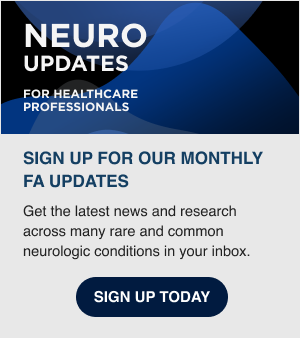Current treatment options for Friedreich's ataxia
Sub Subramony, MD, discusses the current available options for treating and managing Friedreich’s ataxia and its symptoms.
About Sub Subramony, MD
Sub Subramony, MD, is a board-certified neurologist and neuromuscular medicine specialist at the Norman Fixel Institute for Neurological Diseases at University of Florida Health. He also serves as a professor in the University of Florida Department of Neurology with a joint appointment in pediatrics. His area of focus is genetic neuromuscular diseases, including Friedreich’s ataxia.
Transcript
Currently the only approved medication is omaveloxolone, which was approved last year after the first successful trial of a medication in Friedreich’s ataxia.
This, of course, seems to have, at least based on the currently available data, some effect on slowing the progression of the disease; protecting nerve cells; and of course we will understand, as we follow this drug on a long-term basis, how effective it is.
This particular specific treatment currently is approved for patients over the age of 16 and should certainly be offered to these patients. This should be, of course, done in the context of general supportive care, which has already been going on in many of these patients.
So there are many, many issues that patients with Friedreich’s ataxia face, including mobility issues, need for assistive devices, need for speech and swallowing therapy, occupational therapy, et cetera.
They need other medical disciplines such as cardiology in particular because the cardiomyopathy that accompanies Friedreich’s ataxia is indeed a major concern and needs to be appropriately monitored and treated — because the cardiomyopathy can be treated with available drugs that are used for heart disease in other contexts.
Diabetes needs to be monitored so you have all these supportive treatments that these patients need. Pain can be a major problem. Of course, depression and anxiety are all concerns for patients with Friedreich’s ataxia at all ages. So all these need to be addressed in addition to the specific therapy.
Our FA medical advisor
 David Lynch, MD, PhD, is the director of the Friedreich’s Ataxia Program at Children’s Hospital of Philadelphia.
David Lynch, MD, PhD, is the director of the Friedreich’s Ataxia Program at Children’s Hospital of Philadelphia.

